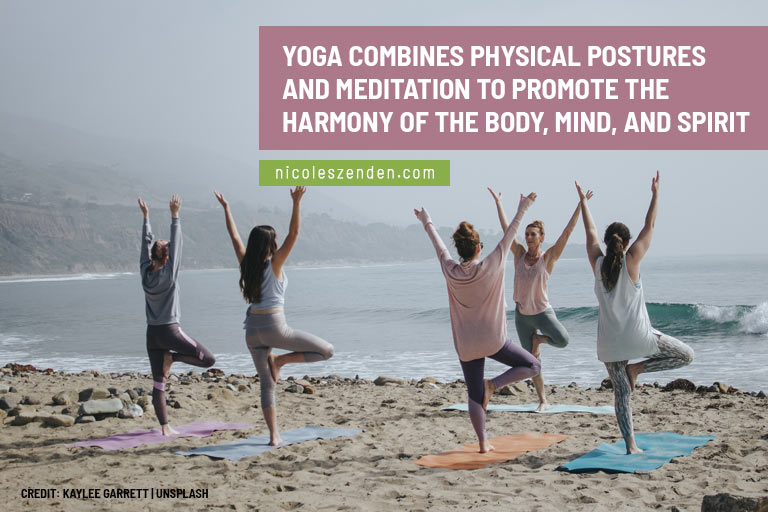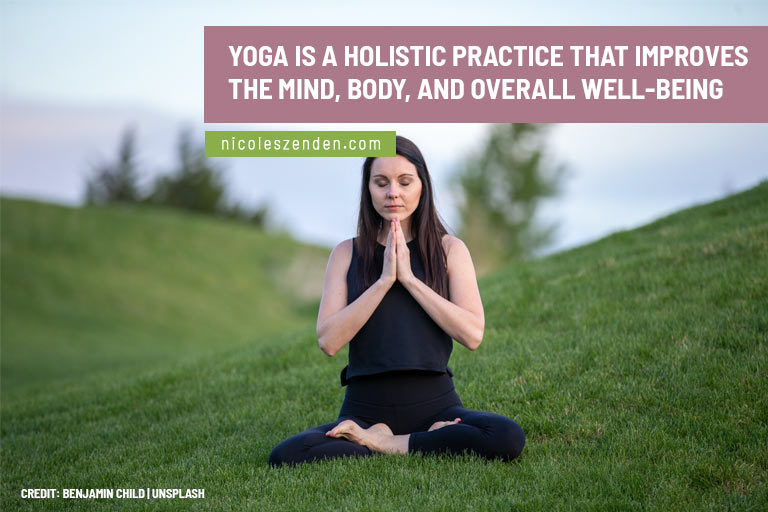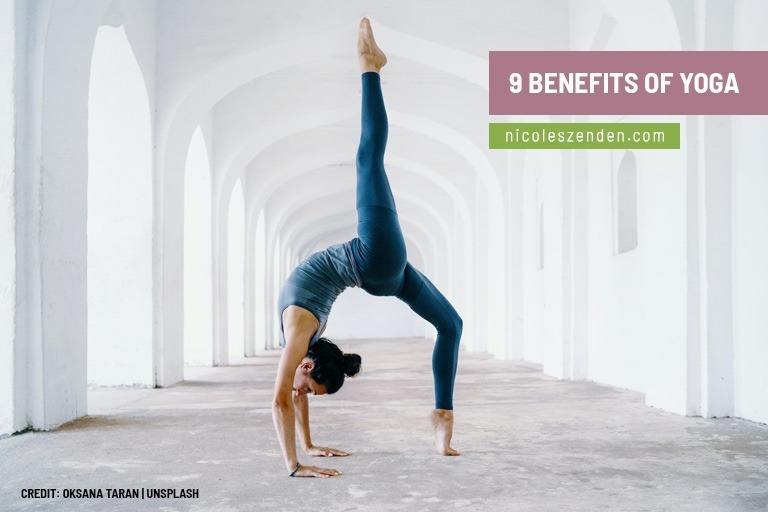Have you done your “downward dog” yoga pose today? If yes, chances are you’re feeling extra calm and relaxed. Whether you’re a seasoned yogi or a beginner, practicing yoga regularly can bring about many unexpected benefits of yoga and overall improvements in your well-being.
Yoga provides physical and mental advantages that benefit individuals of any age. Additionally, if you’re currently dealing with an illness, recuperating from a surgical procedure, or managing a chronic condition, incorporating yoga into your treatment plan can significantly accelerate the healing process.
What Is Yoga?

The term “yoga” originates from the root word “yuj,” meaning “to yoke” or “to bind”. This word encompasses various interpretations, ranging from an astrological alignment to the union of marriage, all sharing the fundamental concept of connection.
Yoga aims to build strength, mindfulness, and balance mentally and physically. There are many types of yoga exercises to foster these goals, too. There are yoga exercises for beginners, yoga exercises for weight loss, and more. Because of this, yoga is accessible to almost everyone.
While scientific research on the benefits of yoga is still in its early stages, much of the existing evidence aligns with what practitioners have understood for thousands of years: The benefits of yoga for adults and kids have profound advantages for our general well-being.
What Are the Benefits of Yoga?

Let’s take a look at some of the many benefits of yoga:
- Improves strength, balance, and flexibility
Are there many benefits of yoga? The answer is yes. The first and most obvious is that it improves flexibility and balance and builds strength. Engaging in gentle movements and practicing deep breathing techniques enhance blood circulation and promote muscle warming. Maintaining a pose for an extended duration can contribute to the development of strength.
In your first yoga class, touching your toes or performing a backbend may be challenging. But with consistent practice, you will gradually experience increased flexibility, making seemingly impossible poses achievable. As you develop strength in yoga, it goes hand in hand with enhancing flexibility.
- Helps with back pain relief
For individuals with lower back pain, yoga is as beneficial as basic stretching to ease pain and improve mobility. Many researchers even recommend yoga as a primary treatment for chronic low back pain. Additionally, by focusing on mobility and flexibility, yoga can help you align your body better by releasing tight muscles, such as the hamstrings, and improving spinal mobility.
- Ease arthritis symptoms
You move your joints through their complete range of motion when you engage in regular yoga practice. This helps prevent degenerative arthritis or minimize disability by effectively “squeezing and soaking” the regions of cartilage that are typically underutilized. Similar to a sponge, joint cartilage requires the fluid to be squeezed out to receive fresh nutrients and allow for the absorption of a new supply. Neglected areas of cartilage, lacking proper nourishment, may eventually deteriorate, exposing the underlying bone like worn-out brake pads.
- Benefits heart health
By consistently elevating your heart rate to the aerobic range, you can effectively reduce the risk of experiencing a heart attack and potentially alleviate symptoms of depression. Although not all forms of yoga are inherently aerobic, vigorous practice or engaging in flow or Ashtanga classes can raise your heart rate to aerobic levels. Even yoga exercises that don’t significantly increase your heart rate can still enhance cardiovascular conditioning.
Research indicates that practicing yoga can lower the resting heart rate, enhance endurance, and improve your body’s capacity to utilize oxygen during physical activity, indicating improved aerobic fitness. A study even demonstrated that individuals who exclusively focused on pranayama (breathing exercises) could perform more exercise with reduced oxygen consumption.
- Relaxes you, to help you sleep better
Yoga encourages you to relax, regulate your breathing, and concentrate on the present, effectively shifting the balance from the fight-or-flight response of the sympathetic nervous system to the calming and restorative parasympathetic nervous system. This shift, known as the relaxation response, results in decreased breathing and heart rates, reduced blood pressure, and enhanced blood flow to the digestive system and reproductive organs.
- Means more energy and brighter moods
Establishing a regular yoga practice can bring about heightened mental and physical vitality, increased attentiveness, enthusiasm, and a reduction in negative emotions. According to a study, maintaining a consistent yoga routine resulted in improved symptoms of depression, accompanied by notable increases in serotonin levels and reductions in monoamine oxidase (an enzyme responsible for neurotransmitter breakdown) and cortisol.
- Helps you manage stress
Managing stress is just one of the many mental benefits of yoga. Scientific research indicates the numerous benefits of yoga, including stress management, mental well-being, mindfulness, healthy eating, weight loss, and improved sleep quality. Yoga can calm the mind and reduce the incessant patterns of negative thoughts and emotions such as frustration, regret, anger, fear, and desire which often contribute to stress.
- Connects you with a supportive community
Engaging in yoga classes can alleviate loneliness and create a setting for collective healing and support. The cultivation of emotional support from loved ones and the community has been consistently proven to enhance overall health and healing. By establishing a regular yoga practice, individuals can foster qualities of friendliness, compassion, and a greater sense of emotional balance.
- Promotes better self-care
In many aspects of conventional medicine, patients often have a passive role in their own care. But in yoga, the emphasis is on the actions you take for yourself. Yoga equips you with the necessary tools to facilitate personal transformation, and you might experience positive changes from the very first attempt at practicing.
As you continue to dedicate yourself to regular practice, you will likely observe increasing benefits. This leads to three significant outcomes: active participation in your own well-being, the realization that your involvement empowers you to bring about change, and the resulting hope derived from witnessing your ability to effect change. This sense of hope, a spiritual benefit of yoga, can be healing.
Yoga is a holistic practice that strives to build strength, mindfulness, and balance in both the mind and body. By focusing on these fundamentals, yoga offers a comprehensive approach to enhancing overall well-being and promoting a harmonious connection between an individual’s mental and physical aspects.
Are you looking for a place to experience the transformative power of yoga in Toronto? Nicole’s Zen Den is a place to be! Discover inner strength, balance, and mindfulness. Embrace wellness and get in touch now.
Book your first yoga session with Nicole’s Zen Den; get in touch with us by sending us an email at info@nicoleszenden.com.

